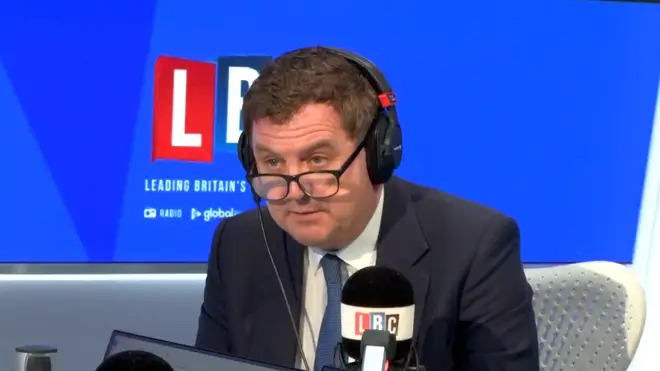
Iain Dale 7pm - 10pm
28 June 2023, 09:55 | Updated: 28 June 2023, 10:06

Why don't we let asylum seekers work? Minister put on the spot by LBC listener
The Work and Pensions Secretary was put on the spot over the Rwanda migrant plan and why asylum seekers in the UK were not allowed to work.
The conversation comes after the Home Office published a report on Monday claiming the Illegal Migration Bill could cost £169,000 per person forcibly removed to a third country such as Rwanda, and that 37% would need to be deterred for the policy to break even.
Speaking on the latest edition of Call The Cabinet, Work and Pensions Secretary Mel Stride
LBC listener Hassan asked the senior Tory why when the country has a “massive labour shortage" why the government doesn’t let the “more than 130,000 asylum seekers work for a living like we do for the Ukrainian refugees.”
Hassan said this would mean the UK would not need to “lock them in barges or try to deport them to Rwanda at £169,000 a pop.”
Mr Stride said the "illegal immigration issue" was at the "heart" of the answer with the "numbers that are coming to our country and not going through the appropriate channels" being a particular problem.
He explained the government was attempting to make it "less attractive" for people who are trying to come to the UK by making the dangerous crossing over the English Channel.
Read more: UK set for hottest June on record - with temperatures to soar even higher to 40C in July
Read more: Working families on universal credit receive cash boost as childcare payments rise by £500
Last year, 45,755 people were detected to have made the perilous journey across the English Channel in small boats.
The Minister told LBC that if those coming here seeking asylum were in a situation where they were allowed to work while their claims were being assessed it would "cut across" the government plans.

Tom Swarbrick reacts to data from Home Office which revealed true cost of deporting migrants
On the Rwanda plan, Nick Ferrari asked Mr Stride if it provided "value for money" when the cost of sending a single person to the country was so high.
Mr Stride said he hoped the scheme would work the same as the deal the UK has with Albania which allows the government to "send people back to Albania if they've come here for the wrong reasons."
He claimed this had led to a "drop in the number of Albanians of well over 90%," he said if the Rwanda plan managed to provide the same drop in numbers it would be "money well spent."

Peers in Westminster have ripped into the assessment, claiming it has failed to consider other policy options and other economic factors, such as the cost of detaining people in limbo if the UK fails to secure removal deals with countries other than Rwanda.
Former deputy first minister of Wales and Liberal Democrat peer Lord German said: "It's no wonder that we've had to wait so long for this impact assessment because it makes uncomfortable reading for the Government.
"It tries to justify the unjustifiable by leaving out the costs of so many pieces of the project.
"It's certainly not rigorous; 'uncertainty' is mentioned 24 times in the impact assessment.
"The Government has only looked at one option and, as the House has heard in committee stage, there are other choices the Government could have made.
"The impact assessment does not at all measure the impact on local authorities, it doesn't measure the impact on the budget of not having the third countries to remove people - people having to remain in limbo - and it doesn't measure the impact on children and on the victims of modern slavery, who are not able to obtain protection and support.
"In essence, this impact assessment has more holes than a gruyere cheese."
The Home Office document published on Monday said the policy of relocating migrants to "safe third countries" could save between £106,000 and £165,000 per person, but the figures are "highly uncertain".
Labour frontbencher Lord Ponsonby castigated the Government for the delay in the publication of the impact assessment, meaning the Commons could not consider it in their scrutiny.
He added: "The impact assessment does not contain an explanation of the costs and benefits, it does not outline alternative policy options and was not published on the same day that the Bill was introduced.
"If this House is to perform its critical function in scrutinising legislation, it is necessary for complete, comprehensive and timely information about the basis on which policy choices are made and the reasons why alternative options have been rejected."
Home Office minister Lord Murray of Blidworth said: "The impact assessment published yesterday supports the need for the change.
"It sets out the broad costs of implementing the Bill, outlines potential savings and highlights examples of where policy and operations have delivered an impact on illegal migration in other countries."
He told peers the impact assessment "makes clear that inaction is simply not an option".
The minister explained: "The volumes and costs associated with illegal migration have risen exponentially, driven by small boat arrivals.
"Unless we act decisively to stop the boats, the cost to the taxpayer and the damage to society will continue to grow."
He noted that Australia's Operation Sovereign Borders, a similar policy aimed at reducing illegal maritime arrivals, successfully reduced these crossings from around 18,000 in 2013 to nearly zero.
Lord Murray told peers that 11,279 people have arrived in the UK by small boat from the start of this year to June 27.
Of those arriving, 13% are female and 12% claim to be unaccompanied children.